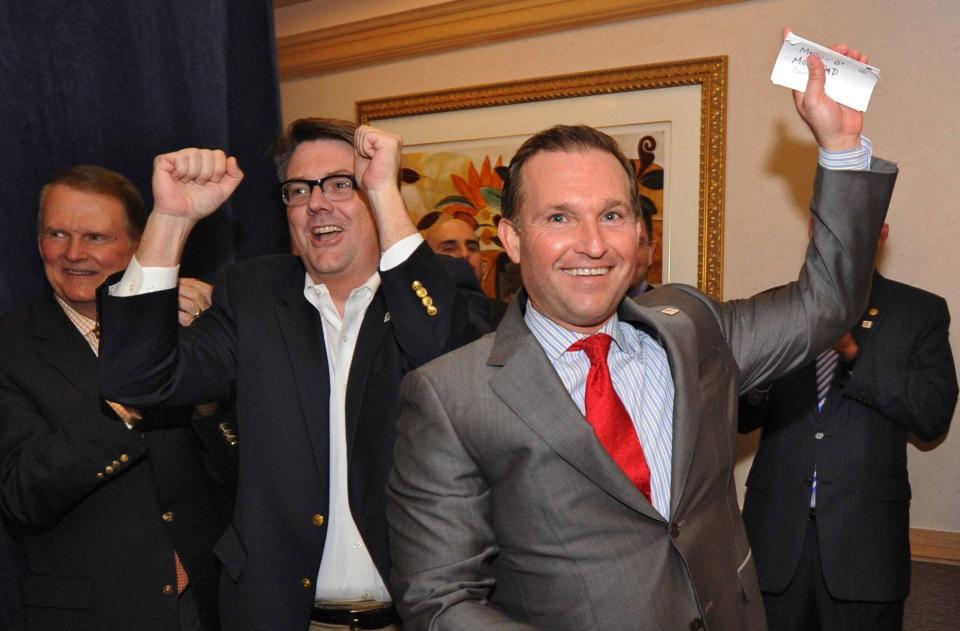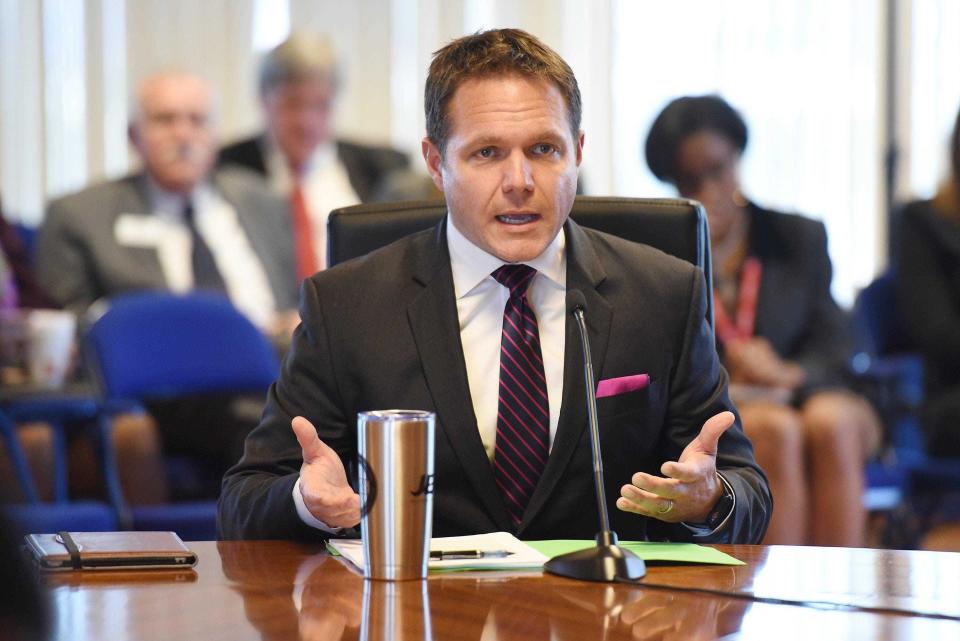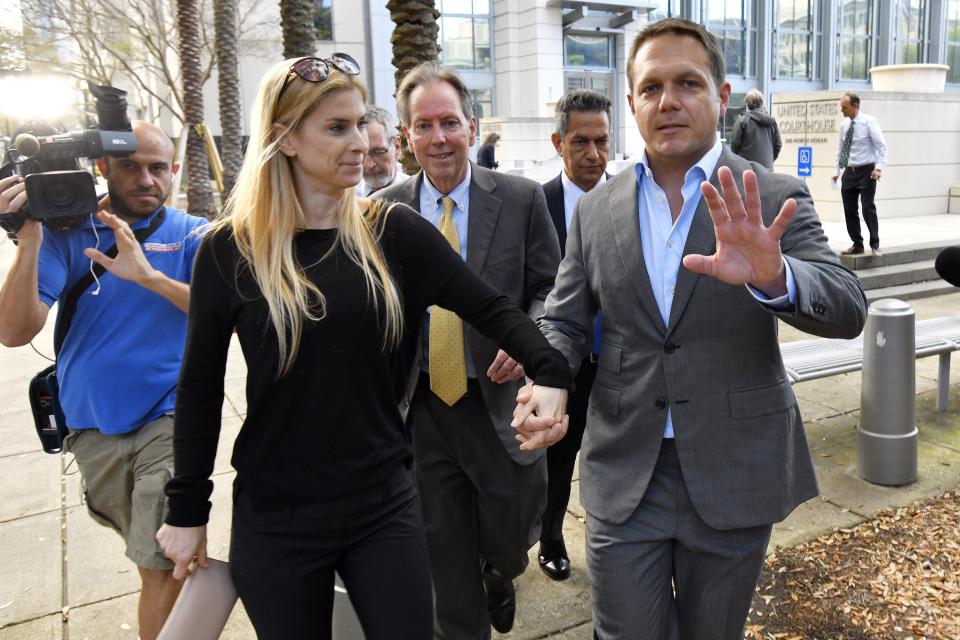Nate Monroe: Aaron Zahn, JEA's once-brash CEO, spun a web of lies that aided his rise and hastened his fall

I. Before Aaron Zahn
When Aaron Zahn joined the JEA board of directors in early 2018, the century-old utility was at near-peak financial performance and had never had higher customer-satisfaction rankings measured by J.D. Power, the kind of dry metrics I had heard agency officials fawn over for years in austere conference rooms over stale coffee and cold cuts.
The sun had set on the halcyon era when utilities could count on 3 percent annual growth in electric sales as a matter of faith, but a succession of CEOs had stabilized JEA's finances after years of major investments in new power plants and civic efforts, like buying conservation land for the Preservation Project. JEA, like all utilities, faced headwinds on the horizon, but Wall Street was happy, not just with an accelerated paydown of JEA's debt that Zahn's predecessor had orchestrated, but its competitive rates, its high-growth service territory and its team of executives, whom analysts trusted. JEA was a leader in the public power industry; what happened at JEA often set the tone for public utilities across the country.
This was the imperfect but enviable legacy Zahn inherited when, inexplicably, he was named the agency's chief executive just months later, despite never before having run a utility of any size. The business experience he did possess did not indicate that board members had hired a savant or a corporate-turnaround artist — as he and they tried to convince the public — but rather that they empowered an ambitious, middling climber whose chief accomplishment seemed to be his stint leading a small wastewater technology firm with a decidedly mixed record of success.
JEA 'death spiral' scenarioused to justify sales attempt in 2019 hasn't happened
The indictment: Federal grand jury indicts former JEA executives on conspiracy, wire fraud
Nate Monroe: The fall of Aaron Zahn
Mark Woods: As he goes from shackles to Bahamas, Aaron Zahn has a lot to think about
During our own efforts to check out Zahn's past, people who had worked with him or who had been customers of his company relayed to us troubling anecdotes about his time running that wastewater firm, BCR Environmental, often on the record but sometimes in private because he left a trail of non-disclosure agreements throughout his time there. A public works employee in Starke — a small North Florida hamlet about an hour southwest of Jacksonville, which had a major falling out with BCR over a failed wastewater project that left the city about $1 million in debt — had vivid memories of confrontations with Zahn, whom he remembered to be an arrogant, city-slicker huckster.
A national search firm JEA hired to ostensibly conduct an above-board hiring process also heard unflattering appraisals of his leadership abilities.
"He plays within the rules, but he knows the rules so well, then you might not see it coming," one person said of Zahn, according to notes taken by an employee of the search firm.
"He is very good at boardroom back dealings."
These were not secrets when the board was — allegedly — weighing the strengths and weaknesses of CEO candidates in the fall of 2018, a talent pool that included one of the top public utility executives in the country.
These were the subjects of front-page stories, of complaints from Jacksonville City Council members alarmed at the board's search process, which from the outset appeared rigged for Zahn. The search firm's notes were available to the board of directors to review; my reporting at the time indicated only one board member bothered to look at them.
Those anecdotes and critiques, as well as some of the challenges Zahn encountered during his time running BCR, were of course not a full picture of the man, who was then 38, but they were remarkable red flags that, coupled with his complete lack of experience, should have ended his candidacy to lead JEA.
Zahn was a stunning departure from the sort of veteran executives JEA had hired in the past to run what was, and is, one of the largest public utilities in the United States and Jacksonville's most important agency — the source of our electricity and our drinking water; a major employer with a workforce of about 2,000 strong; a $2 billion company with a footprint that touches our air, our water and our earth.
What could go wrong?
When the JEA board of directors fired Zahn in January 2020, after months of controversy, the utility had lower credit ratings, lower employee morale, an uncertain future — a remarkable feat for a monopoly — and it sat at the center of public fury. JEA had fallen from being a leader in the public power industry to a pariah. “Aaron, you have us all scratching our heads,” the general manager of Lakeland Electric wrote Zahn a few months before he was fired.
Past JEA chief executives sometimes struggled with media relations and the high levels of transparency Florida law requires of government agencies and officials.
But under Zahn, JEA devoted substantial brainpower to the task of active deception, perfecting the dezinformatsiya-speak of corrupt bureaucracies — weaponizing language to obscure what was happening in plain view. This duplicity was most evident in the myriad ways Zahn's JEA concocted to avoid describing for the public in plain English the very project that eventually consumed his career: Selling JEA to the highest bidder.
Utility records turned over after Zahn's departure indicated JEA's PR consultants — aware of the deep unpopularity of such a proposal — purposefully avoided terms like "sale" and "privatization," opting instead for turgid, indecipherable euphemisms they knew the public wouldn't understand: It wasn't privatization but "recapitalization;" not a sale but an "extraordinary mandatory redemption," a "non-traditional utility response," or "strategic planning."
Zahn was not a greasy salesman but simply there to "transition (JEA) from a centralized power producer to a decentralized, data-focused, customer-centric energy manager."
JEA's c-suite executives, some of them longtime veterans, were initially skeptical of Zahn, who telegraphed disrespect for their contributions.
"We were distrustful of Aaron," one former executive recalled in a sworn interview two years ago with outside attorneys investigating the JEA privatization campaign. "We were distrustful of the Mayor, City Council, the board. We felt like we were — we certainly were not in the know of anything that was going on. Everything that had happened, happened abruptly, very fast, and in a way that, if you told the story today, no one would believe you."
But over time Zahn's penchant for deception and his animosity toward private citizens critical of his tenure — a fact of life that many public officials handle professionally — permeated their ranks.
“Meanwhile, as I see Nate and all the naysayers accuse us of a ‘secretive process’ and ‘playing politics,’ at the end of the day, it will end up being meaningless in the scheme of things,” one communications manager emailed his colleagues, talking about this newspaper and this columnist, a few weeks before the board of directors authorized Zahn to sell JEA.
“They’re just promoting their own agenda to sell papers and win a Pulitzer (lmao) for thinking they will save Jacksonville in the guise of protecting its residents from utter turmoil.”
Federal prosecutors unsealed a grand jury indictment Monday charging Zahn and Ryan Wannemacher, JEA's former chief financial officer, with conspiracy and wire fraud, accusing them of secretly planning to enrich themselves by skimming tens of millions of dollars off the top of potential JEA sale proceeds from a private buyer — money that would have otherwise gone into the city's general fund. Both men pleaded not guilty to the charges Tuesday.
The criminal charges at the heart of the indictment are narrow, but the fraud that prosecutors describe is broad: It calls nearly the entirety of Zahn's tenure at JEA a sham. He had been plotting the ultimately botched campaign to sell the utility "before he was named the permanent CEO of JEA," the indictment alleges.
The grand jury indictment pierces a web of lies that propped up so much of what Zahn did at JEA.
Despite the upending of his career and the peril he now faces with a criminal indictment, however, Zahn remains true to form, clinging to the fiction JEA peddled during his time there: He still refuses to acknowledge he tried to privatize the agency much less profit off it, a predictable but nonetheless breathtakingly brazen defiance given the events of the past several years.
Zahn, his attorney said in a statement this week, is merely guilty of "bringing his extensive private business experience and know-how to JEA and develop innovative ways to improve the utility for the benefit of the community and its ratepayers."
"He challenged the stagnant conventional thinking that permeated JEA and looked for cost-effective and innovative ways, commonly used in private businesses, to diversify revenues and retain the talented employees of JEA."

II. Curry, a political sponsor
You do not name someone like Zahn to run a complex city agency you care about or that you respect, anymore than you'd hire a newspaper columnist to lead safety-planning at a nuclear reactor.
But Jacksonville Mayor Lenny Curry, Zahn's political sponsor through his overnight rise and precipitous fall, did not respect or care for JEA.
"I think there's a — a misnomer, this idea that JEA has value," Tim Baker, Curry's longtime political consultant, told city attorneys in a sworn interview in 2020. "JEA's value is that it overcharges for electricity and remits that excess cash back to the City as a back-door tax, that's the real value of JEA."
Baker's words are indicative of the dismissive, uninformed attitude Curry's administration and political operation — staffed by people who have little regard for Jacksonville's history — often took toward the city's legacy institutions: JEA was bloated, irrelevant, run by rubes, in need of a businessman's touch.
Mark Woods: His name isn't in it, but unsealing of JEA indictment seals Lenny Curry's legacy
Most of all, it was an asset to be monetized: Think of all Curry could do with those billions in sale proceeds, and the political benefit such a thing would accrue. "Jacksonville’s new young Republican mayor is out to shrink government, and wants to privatize JEA — quickly, while the market is 'right.' He says within 3-5 months," a lawyer with the firm Holland & Knight wrote in a legal strategy memo to JEA executives in February 2018, just before Zahn was named the utility's interim CEO.
Curry and his operatives were savvy enough to understand the entrenched unpopularity of privatizing JEA, a lesson he learned during a brief flirtation with the idea in 2018. So in his 2019 re-election campaign, Curry deployed a Zahn-like obfuscation: "I will not be introducing legislation to sell the JEA."
It was blunt enough to leave an impression on a voter paying minimal attention — i.e., the vast majority of them — that Curry didn't support privatization, but its lawyerly syntax was conniving enough to leave him room to do just that, all while claiming he never violated the strict construction of his words.
And sure enough, Curry never did introduce legislation to sell JEA.
That's why he needed Aaron Zahn.
Curry's backing was Zahn's ace-in-the-hole. It was the only clear advantage his CEO candidacy possessed, and the only explanation for the board's bizarre decision to cast aside the resumes of far more experienced, less controversial candidates.
And since Curry didn't care about JEA's long-term future, it didn't much matter that Zahn was incapable of running it, although Zahn seemed unaware of his own limitations.
"I think at least Aaron in his mind believed that he was destined to be the CEO of JEA, that he really believed that he earned it and that he was absolutely the right person at the right time to take JEA into the future," a former executive recalled after Zahn was fired.
"And his words and his actions, at least around me, as uncomfortable as they could be sometimes, he saw himself as a visionary leader of a utility of the future, and he believed that."

III. Curry's ties to FPL
There are darker theories, too, for Curry's dead-set interest in privatizing JEA. It's by now well documented the connections Curry's political operation had to Florida Power & Light, whose parent company, NextEra, bid $11 billion to purchase the city agency — which sits right in the middle of FPL's service territory. Baker, Curry's longtime political operative, was both a consultant to FPL (until the month the board voted to put JEA out for bid) and a friend and informal adviser to Zahn. Baker, during the time he worked for FPL, attended a secret offsite meeting during which JEA officials and their lawyers, bankers and consultants talked about privatization before it was public knowledge.
The federal indictment goes out of its way to mention a brief episode: Just days before the board voted to authorize Zahn to sell JEA to the highest bidder, he met with the CEO of an unnamed potential buyer in West Palm Beach and disclosed that JEA would soon be on the market — something he had gone to great lengths to keep from becoming public knowledge at the time.
This fact was not essential to the criminal case against Zahn; that federal prosecutors mentioned it anyway is notable.
Federal question: Federal prosecutors say former JEA CEO met with potential buyer before board vote. Who was it?
Dark money and JEA: Amid JEA privatization controversy, a City Council member received a mysterious job offer. A dark-money group may have been behind it.
Only one bidder had an obvious connection to Palm Beach County: NextEra, which is headquartered there. The company did not respond to questions about the description of the company in the indictment.
Regardless, the company loomed large over the privatization campaign, and only years of reporting after Zahn's firing revealed the degree to which the company had begun setting the stage to acquire its long-sought prize.
NextEra hired a crack team of consultants, including Baker's business partner, Sam Mousa, who was also a former chief administrative officer under Curry. It planned charitable contributions, including to nonprofits run by members of the Jacksonville City Council. It rented a suite at TIAA Bank Field for Jaguars games, where — despite rules intended to limit contact between active JEA bidders and decision-makers — FPL executives had face-to-face contact with city officials, including the mayor's chief of staff (the city's own suite was right next door).
Secret records from a consulting firm also show that on July 21 — two days after Zahn's alleged meeting with an unnamed company in West Palm Beach, and two days before the board voted to put JEA up for sale — political operatives working on behalf of FPL drafted up a memo that proposed offering a well-paying job at a sham nonprofit to Jacksonville City Council member Garrett Dennis. Dennis was a well-known critic of privatizing JEA. A summary of an internal investigation conducted by that consulting firm alleged the job offer was an effort to remove his dissent from the council, which would have had to sign off on any sale.
That sham nonprofit, Grow United, was incorporated in Delaware on July 24, one day after the consequential JEA board vote.
FPL has said it rejected the deal outright, but Dennis recalled receiving — and blowing off — a job offer from an intermediary with striking similarities to the one described in the confidential records, including a requirement that he step down from the City Council.

IV. A tale of a death spiral
Before anyone could acquire JEA, however, Zahn would have to come up with a pretext to sell it.
Named as interim CEO in early 2018, Zahn quickly set to work casting himself as a seer of destiny, predicting JEA would become the next Blockbuster — the iconic video-rental chain that disappeared virtually overnight because of new competition and technology — if big changes weren't made.
To justify this gloom-and-doom vision, Zahn cherry-picked and mischaracterized data to cast JEA — until then, a well-run, well-respected, stable utility — as a listing barge headed for a glacier. Over the objections of the utility's own analysts, Zahn crafted a highly speculative theory that explosive growth in rooftop solar adoption by customers would contribute to a financial "death spiral" for JEA: That the company would soon see an irreversible decline in electric sales despite adding new customers each year.
This theory ignored the fact that JEA was itself a pioneer of a tactic now being used by Florida's private utilities, including FPL, to strip away the financial incentive for customers to install rooftop solar panels.
Never before had a JEA executive at any level broadcast such a vision of the utility's future; where did this industry neophyte glean such insight?
But Zahn bet the farm on this black-swan scenario and gave board members a false choice: He demanded they allow him to lay off nearly 30 percent of JEA's workforce immediately, or give him the greenlight to privatize, throwing the utility's considerable workforce into understandable panic. That this was not a business theory shared by the public (or private) power industry, that JEA's own filings to credit analysts and regulators didn't support it, that it was by no measure a consensus view — those facts were never shared with the board. In "strategic planning" meetings, this dark vision was viewed as a near-certainty.
This scare tactic, the indictment alleges, was designed to manipulate the board into believing privatization "was necessary to avoid JEA's certain demise."
And the board — incurious, lazy, compromised, or some combination of all three — swallowed this hook, line and sinker, and on July 23, 2019, it gave Zahn what he wanted: Permission to sell the agency, which has been the city's electric utility in some form since the 1880s.
Zahn characterized this campaign as a mere "conversation" with no pre-determined outcome, but a conversation requires honesty. And honesty would require a factual, fair accounting of the benefits of remaining a public utility.
Instead, Zahn had IT employees delete the "benefits of public power" page on JEA's website, and, even as he was selling it — literally preparing to solicit offers for it — his PR managers steeled themselves for the unenviable task they would soon face: To insist that very thing was not, in fact, happening.
“I think Aaron definitely wants to know how we are going to address inevitable questions and accusations that will arise from this next board meeting,” a JEA communications manager wrote a few weeks before the consequential July 23 meeting.
A question-and-answer strategy document, prepared by JEA communications officials in the weeks before the July 23 vote, was even more misleading. Anticipating the question, "Is this just a ploy to push privatization," the document recommended Zahn saying, "If what you're saying is, I’m going to put a ‘for sale’ sign in front of JEA tomorrow — the answer is no."
The answer was yes.
To damage JEA's reputation and make the prospect of a sale seem more enticing, the utility sent mailers to customers with misleading claims designed to confuse them, claiming, for example, that over the past 10 years, "JEA raised customer rates by 71 percent." This was a clever obfuscation that side-stepped the fact that actual customer bills had declined over that same period; like so much else during Zahn's tenure, it was trickery.
It would take years of reporting and investigation by a City Council committee to learn that Zahn had in fact held secret, off-site planning meetings with bankers, lawyers and others where the privatization push had been orchestrated even before the board had given him authorization. Some of these firms were hired without signed contracts, which kept the work off the books until it was too late to do anything about it.
And contrary to the normal way things were done, the federal indictment alleges, Zahn prevented employees from uploading the board's July 23 agenda to JEA's website ahead of the meeting, which also had the effect of keeping the public in the dark about what was about to happen. That finding by the grand jury is backed up by internal text messages among utility officials, who acknowledged receiving a public-records request a week prior from the newspaper for the presentation Zahn and his team were planning to give; they never turned it over.
" ... remember, we're just stalling," one communications employee wrote. "So long as we get to Tuesday it really doesn't matter. Fingers crossed!"
Their ruse worked, at least in the short term.
“If you’d been paying attention, you’d have seen the historic moment coming," Alan Howard, a JEA board member, astonishingly declared that day.

V. Curry's support
Curry stepped in for Zahn at key moments, vouching for and defending his ally. He adopted Zahn's gobbledygook soothsaying about JEA's future and echoed Zahn's insistence the very explicit effort to privatize the agency — occurring in plain view — was merely an "exploration."
“He’s the CEO of an incredibly large utility who’s got an incredibly important job. He’s led through an incredibly challenging year and has been attacked viciously, unfairly by some," Curry once told Florida Politics.
“Maybe it’s a new way of thinking for an organization like JEA,” he added. “But it’s pretty common in business.”
Some of Curry's fiercest critics are frustrated the mayor is not named in the indictment; this both underestimates the difficulty of going after public corruption — even this more narrow case is remarkable for traditionally risk-averse federal prosecutors to pursue — and misreads the indictment itself.
He may not be mentioned by name, but Curry is sullied by the facts presented.
Prosecutors, for example, went out of their way to note Zahn's lack of experience prior to winning the CEO job, another statement that was not central to the criminal case but nonetheless tips the government's hand about how it views the way Zahn got the job.
Most significantly, the indictment is explicit about this: The pretext Zahn provided the board and the public to win authorization to sell JEA was a fraud. And it was that very pretext Curry supported, defended, and, when Zahn was placed on administrative leave as controversies around him mounted, tried to finish.
Time itself has given lie to Zahn's doom-and-gloom wishcasting. Nearly three years into the projections he gave the board, little of what he predicted is happening. JEA's workforce has slightly grown; electric sales were a tad higher than expected. The pressure on JEA's rates — rising fuel costs — played no role in Zahn's gloom-and-doom predictions.
JEA is simply not in a "death spiral."
But lying to the public is not a crime, and so Curry skates on his most obvious misdeed.
What did he know of the facts surrounding the criminal charges? Did Curry know about the secret bonus plan Zahn and Wannemacher, the CFO, are alleged to have dreamed up?
Over the course of several years of reporting, I have never come across evidence, including on-and-off record discussions with city and utility officials and others, that provided any convincing reason to think he did.

VI. "The savior of JEA"
JEA's value belongs to everyone and no one: It is the result of all of us paying into it, and the stewardship of generations of employees who work there. My own view, shared by some who worked with him at JEA, is that Zahn — incorrectly — came to believe he was responsible for that value and was thus entitled to a piece of it, and so he sought to warp JEA's value into an investment vehicle he could covert into cold hard cash.
Prosecutors found evidence he and Wannemacher had been scheming to do this as early as March 2019, months before he had fully fleshed out his pretext to sell JEA.
A defense I expect Zahn and Wannemacher to claim, should they take this to trial, is that there was, ultimately, no theft — their plot was foiled by City Council Auditors, city attorneys, council members and public pressure. The system worked, their lawyers might argue: An admittedly bad idea never came to fruition.
Except it did. Zahn and Wannemacher are accused of lying to the board of directors to win their authorization to implement the plan. Although they later tried to characterize that vote as something more akin to an initial greenlighting of a concept they were still working on, the resolution the board passed made it clear this was a final approval — language prosecutors note in the criminal indictment.
And if, as prosecutors allege, the entire sales campaign was based on fraud — designed to further their scheme to get rich quick — then there was in fact considerable loss to ratepayers. A final accounting of the costs related to privatization is difficult to total authoritatively, in part because of some accounting games the executives played when budgeting for it, but it's near $20 million, if not substantially more.
There were also the difficult-to-calculate costs of the downgrade to JEA's credit rating — the result of a foolish, no-shot lawsuit Zahn initiated to attempt to weasel out of an unbreakable contractual obligation to help build two nuclear reactors in Georgia — and the destruction of JEA's reputation among its peers.
And of course there was the loss of time: Time for JEA to plan for its actual, real-life challenges; time this city had to debate worthy issues; time the utility's employees lost worrying about their future.
Zahn often seemed to resent the public scrutiny he received, but he deliberately turned himself into one of the city's most visible public officials — not just by pursuing a divisive policy like privatization, but by other campaigns, too, like shelling out $300,000 in ratepayer money for a multi-day conference on innovation in which he was a key speaker.
Employees have told my colleagues and me over the years Zahn reacted with both hurt and anger that he was never able to win over JEA's workforce. But what precisely did he expect?
Often, the most gullible recipient of his lies seemed to be Zahn himself.
In one sworn interview with a former JEA executive, lawyers investigating Zahn's tenure asked a question I and others often wondered during the tumultuous days of his reign: What did Zahn want people to think of him?
“That he deserved the job, that he was going to lead JEA into the future if people just understood everything we were doing at JEA, that they would understand he was leading us into this path of the future and that it was solely him that was doing so and that he had come in to be the savior of JEA,” the executive said.
“ … he felt like if we were good at our jobs … people would pay attention to this amazing path he was leading us down and people would pay attention to him, and people would see the promise of JEA and Aaron Zahn.”
Nate Monroe is a metro columnist whose work regularly appears every Thursday and Sunday. Follow him on Twitter @NateMonroeTU.
This article originally appeared on Florida Times-Union: How Aaron Zahn, ex-JEA CEO, spun a web of lies that hastened his fall

